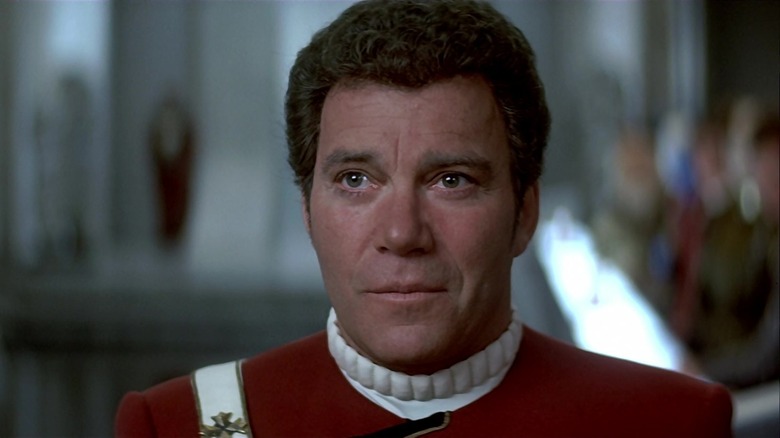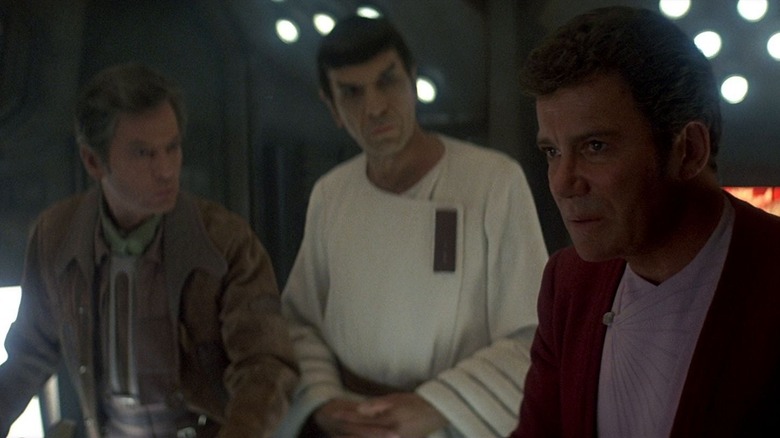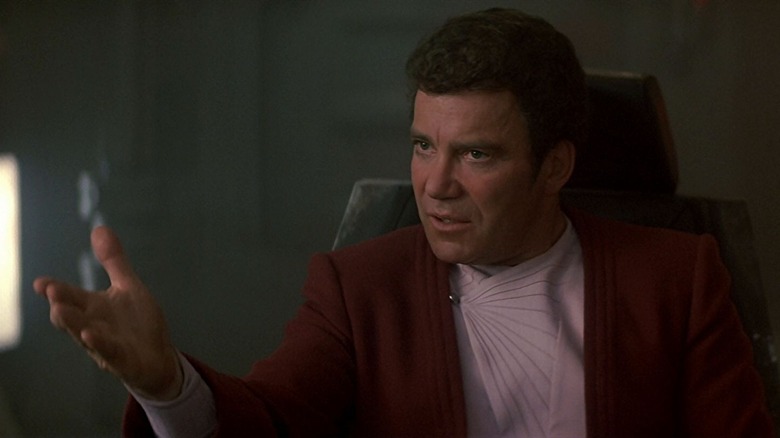Star Trek IV: The Voyage Home Was Forced To Follow A Strict William Shatner Rule
Two of the credited screenwriters on Leonard Nimoy's "Star Trek IV: The Voyage Home" were Steve Meerson and Peter Krikes, the screenwriters behind the Frankie Avalon/Annette Funicello flick "Back to the Beach," the two-Van-Dammes-for-the-price-of-one movie "Double Impact," and the 1999 would-be Oscar darling "Anna and the King." "Star Trek IV" was one of their first major screenwriting gigs, and it was a dizzying experience. The screenwriters remembered meeting with Nimoy and with producer Harve Bennett for a brainstorming session, and it seems that no one could come to any kind of solid conclusions. Bennett mentioned that he wanted the next movie to be a throwback to "The City on the Edge of Forever," one of the most celebrated episodes of the series. Nimoy was in a weird headspace, talking about environmentalism and biodiversity. Meerson recalls: "Leonard started talking about plankton, cells, that cells become plankton, that things eat plankton ... and that's when whales entered the conversation."
These stories were all told in the oral history book "Captains' Logs: The Unauthorized Complete Trek Voyages," edited by Mark A. Altman and Edward Gross. Meerson and Krikes talked about the process of writing the film, and some of the strange mandates handed to them by the studio. For one, they had to keep Eddie Murphy in mind as a potential guest star. Murphy was an enormous box office draw at the time, and he had expressed some interest.
Frustratingly, Meerson and Krikes were ordered to include as much Admiral Kirk (William Shatner) as possible. Kirk, they were told, had to instigate every action in the movie.
When Kirk isn't on screen, everyone should be asking 'Where's Kirk?'
Trekkies have long known about William Shatner's egotistical behavior on set, and how he always saw himself as the one true lead of "Star Trek." Extending from that assertion, Nimoy and DeForest Kelley were his co-leads, while the other actors were mere backup members of an ensemble. Because he felt he was the star, Shatner was known to be brusque and dismissive to other actors, and often hogged the spotlight, tried to steal other actors' lines for himself, and generally behaved like a big ol' a-hole. It wouldn't be for years that Shatner and some of his co-stars — but only some of them — would reconcile and, in some cases, become close friends.
In 1986, Paramount seemed willing to kowtow to Shatner's ego, and demanded that Kirk be put front and center in "Star Trek IV," even if it's not Kirk's story. Meerson recalled the instructions clearly:
"The approach we were told to take is that Kirk really had to be the one to lead everyone. [...] Not necessarily that he had to actually have the idea to do something, but it had to appear as if he has the idea."
Krikes recalled how illogical the mandate was, and how, when you watch the film, you can see how Kirk has been arbitrarily inserted into various scenes where he doesn't belong. For example, there's a scene near the end of the movie in which Spock (Nimoy) has a conversation with his father Sarek (Mark Lenard). Kirk is present in the background, watching the conversation. There is no reason for him to be there. But, golly, that's what Paramount wanted.
The Star Trek IV writers were basically instructed to use inception on Kirk
Meerson cited another notable example of Kirk overexposure, citing the scene where Kirk appears to be the one to make a crucial decision, when in actuality it was Spock's idea. He said:
"I think the perfect example in the movie is when Spock goes into the belly of the Bird of Prey to use the computers and learns that the sound is whale songs. It's Kirk who has the idea to go back through time, although Spock is the one who plants the suggestion in Kirk's mind. Kirk verbalizes it, and that's the way it had to be played. We were told Bill had to be the leader at all times. In that scene, if you're reading it, you say, 'It's Spock's idea,' but on film, Spock's discovery that it's humpback whales is not as important as Kirk's idea of going to get them."
Shatner famously only agreed to appear in "Star Trek IV" if he would be allowed to direct and pitch a "Star Trek V." He also received a hefty $2 million paycheck. It's likely the "all Kirk all the time" approach to the "Star Trek IV" screenplay was either a mandate Shatner implemented himself, or it was Harve Bennett merely trying to make a tempestuous star happy. Either way, Kirk had to be foregrounded.
Luckily, Nimoy did an exemplary job of highlighting the rest of the ensemble as well, giving everyone vital actions to perform. Indeed, of the six extant "Trek" movies, "Star Trek IV" feels the most like an ensemble drama, even if Kirk did have the most lines. "Star Trek IV" was a huge hit, becoming the highest-grossing "Trek" movie until the release of J.J. Abrams' "Star Trek" in 2009.
"Star Trek V," meanwhile, bombed pretty hard.


